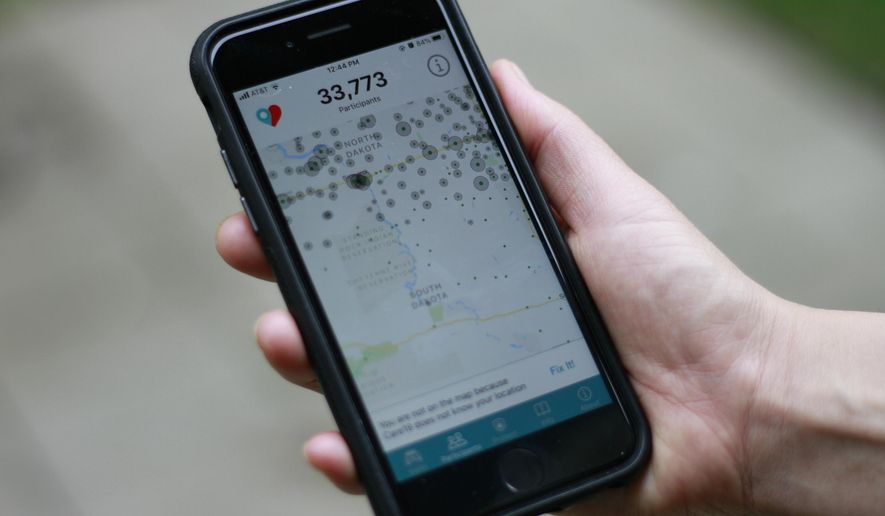Google tracked the locations of 300 million people and gave the data to a handful of scientists whom the company deemed worthy. But exactly who has the data, what data the scientists have and what they will do with it is a bit of a mystery.
Google began handing over users’ data to the scientists before the coronavirus outbreak and has continued giving them special access during the pandemic. In May, the scientists published a paper revealing that the data was “aggregated from over 300 million smartphone users” and “cover nearly all countries and 65% of Earth’s populated surface.”
The smartphone users were not aware they were being studied, according to the paper, which was published in Nature Human Behavior. In other scientific studies, participants are actively observed. Users who opted into Google Location History on their smartphones had their locations collected from a variety of signals on their devices, including through Wi-Fi, GPS and cellphone tower triangulation.
“We first apply machine learning to location data points to segment them into semantic ’trips,’” the 11 scientists wrote. “The system automatically finds trips by taking into account a variety of signals, such as timing of location points, dwell times, and other factors. This, for example, includes stops at airports and other locations on a multi-stop international itinerary.”
The scientists who have published on some of the data found that the U.S. and Mexico have “one of the busiest borders,” and the most restrictive borders are between Turkey and Armenia, Morocco and Algeria, and Israel and Gaza, according to the paper, which is accessible via ResearchGate.
Weather and daylight patterns also affect physical movement, and the scientists said people are most active in July and August.
“Peaks outside this period mostly coincide with national and/or religious holidays such as Easter, the Hajj, and Thanksgiving in the United States,” the scientists wrote. “Unsurprisingly the lowest frequency of movement is observed in January.”
Otherwise, nobody besides the scientists and Google knows what else can be gleaned from the information.
The scientists say the aggregated data is available to those who want access upon “reasonable request” by contacting the authors and filling out a request form that Google will approve or deny. Google said it provides data to research institutions, not governments, and enters into agreements with those using the data to block them from sharing it with others.
“The mobility data set is based on aggregate, anonymized location data, and has been made available to a small set of academic researchers to help understand the spread of COVID-19,” a Google representative said in a statement.
Google has allowed the public to see certain data in its “COVID-19 Community Mobility Reports,” which are compiled to help public health officials, doctors and others examine how to tailor social distancing policies during the COVID-19 pandemic. The mobility reports are searchable online by country and region.
Rachel Bovard, senior adviser to the right-leaning Internet Accountability Project, said she has concerns about how Google handles users’ data.
“Google has a troubling pattern of accumulating massive troves of personal data on individuals without any transparency regarding what they’re doing with it or with whom it is being shared,” Ms. Bovard said. “The company is a serial violator of user privacy and has largely been unaccountable for it. Congressional oversight isn’t just warranted; it is needed.”
Arizona sued Google last week for allegedly using deceit and unfair business practices to get its users’ location data. Arizona’s complaint said people who disabled the location tracker still had their movements tracked and that Google confused users attempting to opt out of the location tracking.
“While Google users are led to believe they can opt out of location tracking, the company exploits other avenues to invade personal privacy,” Arizona Attorney General Mark Brnovich said. “It’s nearly impossible to stop Google from tracking your movements without your knowledge or consent.”
Some privacy experts are not fretting about Google’s data collection. Ryan Calo, a University of Washington law professor, said concerns could involve the fairness of access to the data and the terms involved in accessing it, but he thinks there is not much cause for concern.
“I don’t see a lot of reason to worry. It is not as though Google is telling researchers where specific people are or have been,” Mr. Calo said in an email. “It looks like the data is aggregated and, as a researcher, I am in favor of access to industry data if the privacy harms can be mitigated.”
Zach Graves, policy head at the Lincoln Network technology policy advocacy group, said he has not seen the data at issue but he favors making such information accessible to researchers.
“I generally think it’s a good idea to allow broad public interest/research exemptions for use of this sort of data,” Mr. Graves said in an email. “Of course, it’s important they also adhere to industry best practices to remove personally identifiable information and limit the possibility of such information getting leaked.”
Google also has collaborated with Apple on a contact-tracing project that uses a Bluetooth-based system on phones to monitor users’ potential exposure to coronavirus-infected people. The companies have said the technology does not collect location information and requires users to opt in to participate.
• Ryan Lovelace can be reached at rlovelace@washingtontimes.com.




Please read our comment policy before commenting.